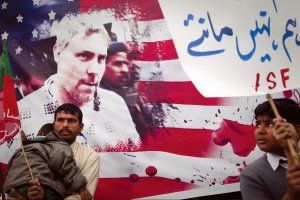
Anti-American sentiment is running high in Pakistan as the country negotiates the fate of CIA contractor Raymond Davis, who shot and killed two Pakistanis in Lahore in January. The military, which initially kept quiet over the affair, fanned nationalist flames on Feb. 19 when its spy agency, the Inter-Services Intelligence (ISI), published a letter announcing that the "CIA has virtually put [our] partnership into question" and hinted that relations between the two agencies might be irreparably damaged.
But it's hard to believe that the ISI had no knowledge of Davis's covert activities in Pakistan. The ISI is thought to be deeply involved in visa clearances for agents like Davis. Last July, Adm. Mike Mullen, chairman of the Joint Chiefs of Staff, complained to a former Pakistani general that the military's visa clampdown was jeopardizing relations. The former general told NEWSWEEK that, in response to U.S. pressure, the civilian government might have given a green light to the Pakistani Embassy in D.C. to clear the visa backlog—but Davis got his visa prior to that time.
And even if the military didn't know about Davis, it's hard to deny that its relationship with the CIA is closer than publicly acknowledged. The two agencies work together on the CIA's drone-strike program and other antiterrorism operations. It's a relationship born, in part, of necessity—the U.S. funnels $400 million annually to Pakistan's military, which nevertheless remains mired in a budget crisis. The agency's tacit support for the drone strikes is thought to be a result of its lack of funds: drones are far cheaper than full-scale military operations to eliminate terrorist suspects. Still, the military is painfully aware of the thin tightrope it walks between cooperating with the U.S. and appeasing the Pakistani people. "Drone strikes are bad," said a senior military official on condition of anonymity. "I have said this privately to American officials as well…public opinion is against them, and public opinion is most important."
As such, the ISI's statements on Davis can be seen as the latest move to play tough cop to the U.S. in order to please the public: in December, for example, the ISI is believed to have blown the identity of a CIA station chief in retaliation over its own chief being summoned by a U.S. court to testify on the Mumbai attacks. The posturing apparently works: the military has an 84 percent approval rating among Pakistanis. How long the military can juggle the U.S. and the public, though, is a big unknown.
Ahmed is editor of NEWSWEEK Pakistan.
Uncommon Knowledge
Newsweek is committed to challenging conventional wisdom and finding connections in the search for common ground.
Newsweek is committed to challenging conventional wisdom and finding connections in the search for common ground.





